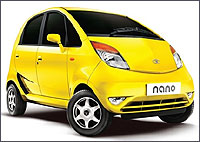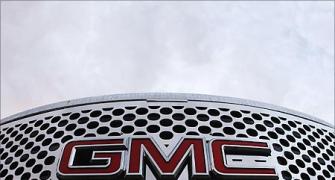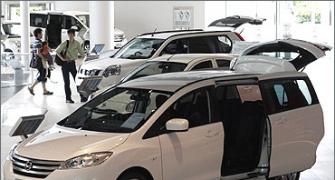Despite launching several aggressive marketing, finance, sales and distribution techniques, demand for the low-cost car Tata Nano has failed to live up to targets set by Tata Motors, India's biggest auto maker.
 Nano sales last month dipped to 3,260 units, down by 64 per cent as against 9,000 units recorded same month last year.
Nano sales last month dipped to 3,260 units, down by 64 per cent as against 9,000 units recorded same month last year.
Over the previous two months Nano sales have nearly halved to 8,712 units as against 16,704 recorded in the corresponding two months previous year.
Tata Motors slashed production of the small car by 31 per cent during the past two months as the company did not have too many takers of the car following stocks of the Nano lying unsold with dealers.
After launching zero down payment subsidised finance schemes with discounts, two-wheeler exchange arrangements, extended warranty programmes and opening of Nano dedicated kiosks across the country, demand for the car remains far below than the targeted monthly run rate of around 12,000-15,000 units announced by the company earlier.
Having exhausted all the means, Tata Motors is banking on positive word-of-mouth publicity from about 100,000 Nano customers for an uptick in demand for the car and also on new variants scheduled to hit the market later this financial year.
Carl Peter-Forster, managing director and group chief executive, Tata Motors said, "We have a very satisfied set of customers owing the Nano which means there is nothing wrong with the product. So now the positive word of mouth of the car will spread and that is how we are anticipating growth in sales from here on."
While the present slowdown in demand for personal vehicles hasn't helped demand of compact hatchbacks, Nano has taken the strongest hit.
Its sales were lower than Ford's Figo which carries a price tag of more than twice the price of Nano at Rs 370,000 even while Ford's distribution strength is one-third the size of Tata Motors.
While the Nano continues to be available through 620 dealers across several states in addition to dedicated Nano kiosks and mobile display units, the company is aiming to step up its drive through the hinterlands to spruce sales.
Replying to shareholder queries on the poor performance of the Nano, Ratan Tata, chairman Tata Motors said at the company's 66th annual general meeting last week, "The company is working on various steps to boost the sales of the Nano including the launch of variants. There can be an electric version of the Nano. We will also see what benefits can be achieved for the Nano from the Pixel, which we showcased at the Geneva Auto Show this year."
Among the variants which Tata Motors plans to launch in the course of time will be the much anticipated diesel variant. With the gap in price of petrol and diesel now close to 50 per cent consumers are shifting their choice to diesel models despite their steeper price tags.
Although the diesel Nano is expected to cost no less than Rs 200,000 (ex-showroom), it will be the most fuel-efficient car on Indian roads sporting one of the smallest diesel engines in the world. The base variant of the Nano presently costs Rs 1.53 lakh (ex-showroom, Mumbai) and returns a mileage of around 23kms/litre.
Further, to improve the utilisation of the Sanand plant in Gujarat where the Nano is made, Tata Motors is readying to explore newer international markets in addition to Sri Lanka and Nepal where exports of the car have started.
The company is in talks with manufacturing groups in Indonesia and Brazil to set up a Nano assembly plant there which will not only serve the two nations but also the adjoining countries of South-East Asia and Latin America, respectively.








